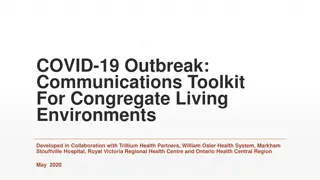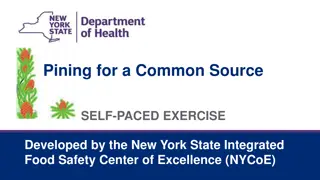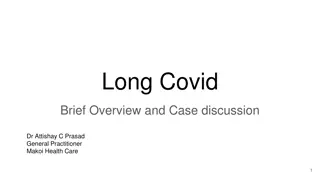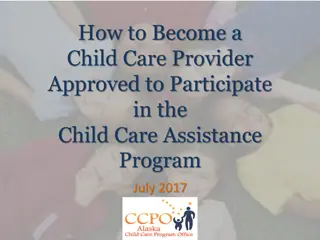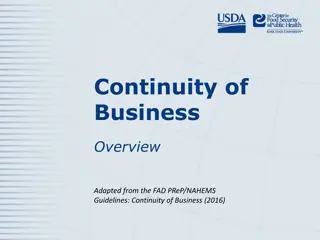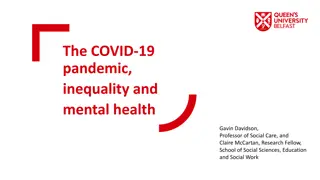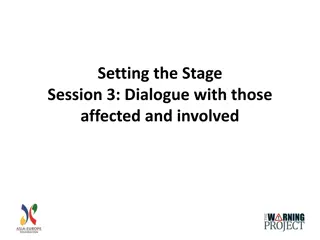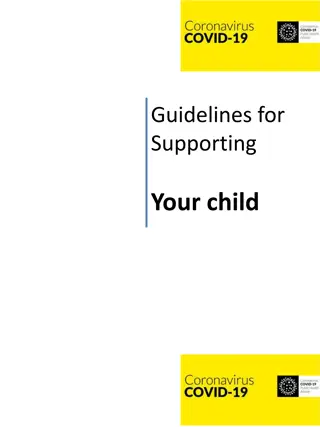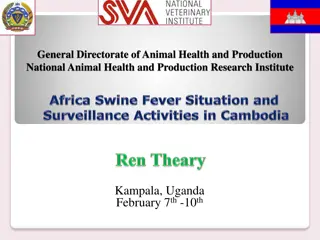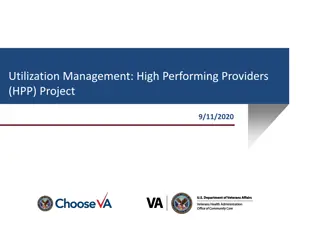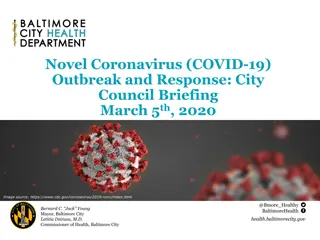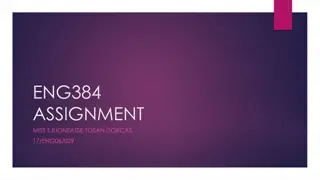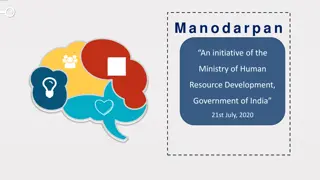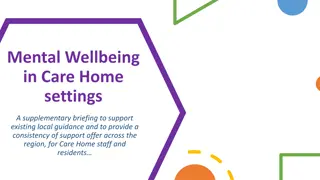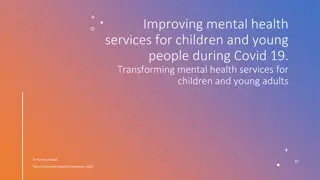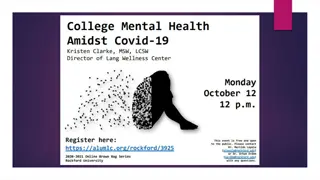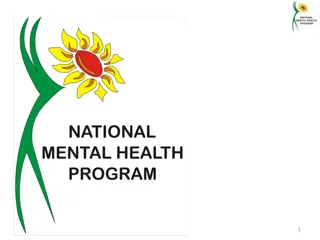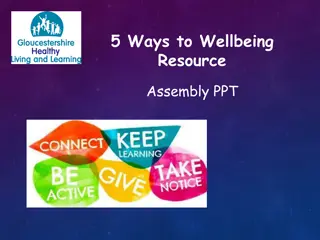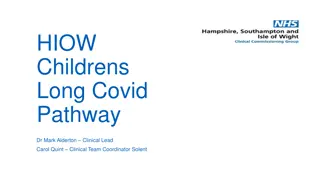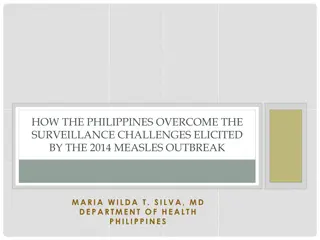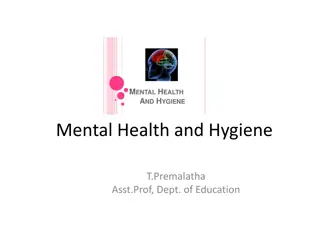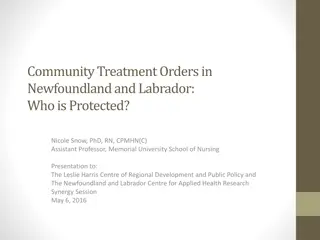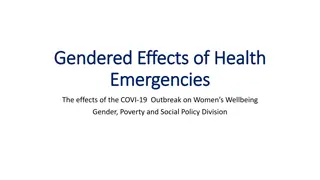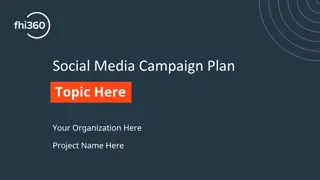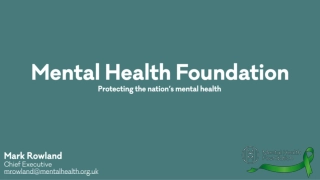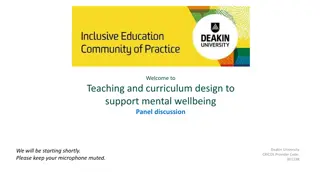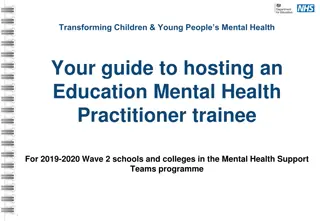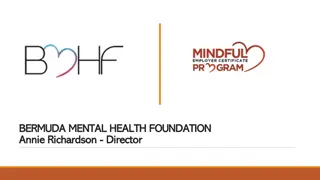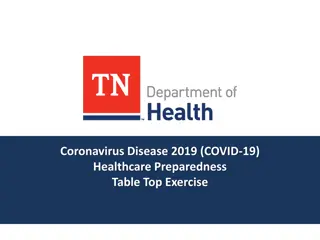Resources and Strategies for Mental Health Providers During COVID-19 Outbreak
This resource provides helpful strategies for mental health providers during the COVID-19 outbreak, emphasizing self-care, staying informed, supporting essential personnel, ensuring safety, and addressing basic needs like food distribution and emotional safety for families. It also offers access to additional resources and tools for the community. Stay up-to-date, take care of yourself, and support those in need during these challenging times.
Download Presentation

Please find below an Image/Link to download the presentation.
The content on the website is provided AS IS for your information and personal use only. It may not be sold, licensed, or shared on other websites without obtaining consent from the author. Download presentation by click this link. If you encounter any issues during the download, it is possible that the publisher has removed the file from their server.
E N D
Presentation Transcript
Resources and Strategies for Mental Health Providers During COVID-19 Outbreak CENTER OF EXCELLENCE FOR INFANT AND EARLY CHILDHOOD MENTAL HEALTH, DIVISION OF CHILD AND ADOLESCENT PSYCHIATRY, UNIVERSITY OF MARYLAND SCHOOL OF MEDICINE
Caring for yourself and your family: Caring for yourself and your family: Are you wearing your life jacket? Are you wearing your life jacket? Your health and well-being is essential Be kind to yourself Establish routines and ways of working that set you up for success Reach out for help Explore the resources to help you perform your role Join our Facebook Community and get access to resources for you and your family and the community you serve: https://www.facebook.com/iECMHMaryland/
Be Informed Be Informed Stay up-to-date: Maryland Department of Health: https://coronavirus.maryland.gov/ Deaf and Hard of Hearing: https://odhh.maryland.gov/corona virus/ Center for Disease Control: https://www.cdc.gov/coronavirus/2 019-ncov/index.html
Essential Personnel Only Essential Personnel Only If you are an essential employee and need child care call Locate Child Care: 877-261-0060
Safety first Safety first Explore families concerns about physical safety (housing, domestic violence) and basic needs (food, etc.) Problem solve how to meet those safety needs. Resources: Maryland 211
Food Call school or go on the website below to locate food distribution for youth during the closure: https://state.nokidhungry.org/maryl and/2020/03/13/school-districts- serving-meals-during-school- closures/ https://mars.msde.maryland.gov/m ars_sitesearch/ You can visit mdsummermeals.org Currently, the state is providing 3 meals a day and a snack to students who need it during the school closure.
Emotional Safety Emotional Safety Explore emotional safety to support wellness and reduce risks of family conflict, violence and suicide. If concerns regarding domestic abuse or suicide arise consider the following evidence based assessments and safety plans
Free Evidence Based Training: Skills for Free Evidence Based Training: Skills for Psychological Recovery Online Available Psychological Recovery Online Available Now on the NCTSN Learning Center Now on the NCTSN Learning Center This 5-hour interactive online course designed for providers to help survivors gain skills to manage distress and cope with post-disaster stress and adversity. This course is for individuals who want to learn about using SPR, learning the goals and rationale of each core skill, delivering SPR, and supporting survivors in the aftermath of a disaster or traumatic event. https://learn.nctsn.org/course/view.php?id=535
Domestic Violence Resources: Evidence Domestic Violence Resources: Evidence base resources base resources Evidence based Danger Assessment (Johns Hopkins Resource): https://nursing.jhu.edu/news- events/news/archives/2005/domestic_violence _risk_tool.html https://www.dangerassessment.org/ Evidence based MyPlan App (collaboration with Johns Hopkins and One Love): myPlan is a tool to help with safety decisions if you, or someone you care about, is experiencing abuse in their intimate relationship. Download myPlan for free: https://www.myplanapp.org/about NATIONAL DOMESTIC VIOLENCE HOTLINE 1-800-799-7233 Maryland Network Against Domestic Violence 6911 Laurel Bowie Road, Suite 309 Bowie, MD 20715 TOLL-FREE: 800-MD-HELPS Phone: 301-352-4574 http://www.mnadv.org House of Ruth: 410-889-7884 (RUTH) http://www.hruth.org
Suicide Assessment and Safety Plan: Suicide Assessment and Safety Plan: Evidence based Resources Evidence based Resources ASQ: Ask Suicide Screening Questions: https://www.nimh.nih.gov/research/rese arch-conducted-at-nimh/asq-toolkit- materials/index.shtml Brown Stanley Safety Plan: https://suicidepreventionlifeline.org/wp- content/uploads/2016/08/Brown_Stanley SafetyPlanTemplate.pdf 24/7 National Suicide Prevention Lifeline 1-800-273- TALK (8255) En Espa ol: 1-888- 628-9454 or 24/7 Crisis Text Line: Text HOME to 741-741 Maryland Youth Crisis Hotline 800-422-0009 Baltimore Crisis Response 410- 752-2272 First Call for Help 410-685-0525
State Hotlines State Hotlines For Life Threatening Emergencies DIAL 9-1-1 Maryland Crisis Hotline/ DIAL 211 (and press option 1) or text 898211 Maryland Suicide Prevention Program or visit 211md.org 2-1-1 MARYLAND 24 hours a Day to connect Maryland residents to health and human service resources DIAL 2-1-1 or visit online at https://211md.org
Coping Coping If it is mentionable it is manageable -Fred Rogers When we can talk about the situation we are better able to manage our feelings, process our thoughts and put plans to stay safe into place and cope with difficult times. Talk with children and explain why things are different. Be sure not to scare and let them know that many people are helping out and that they can be helpers, too, by washing their hands, adhering to social distancing rules and following all the health and safety rules.
Evidence based resources to help parents Evidence based resources to help parents talk with children about COVID talk with children about COVID- -19 Outbreak Outbreak NATIONAL CHILD TRAUMATIC STRESS NETWORK 19 https://www.nctsn.org/resources/parent-caregiver-guide-to- helping-families-cope-with-the-coronavirus-disease-2019 ZERO TO THREE https://www.zerotothree.org/resources/3210-tips-for-families- coronavirus
Coping Coping Help parents see for signs of stress in themselves and in their children. Emphasis that is essential for parents to take care of yourself so that you can be there for your family. Routines can help everyone stay in touch and reduce stress. If the ones you have in place are working, stick to them, if not create new ones for this special time. Trauma informed Parenting during the staycation https://www.attachmenttraumanet work.org/wp- content/uploads/social-distancing- infographic-final.pdf
FREE Evidence based training on the ARC FREE Evidence based training on the ARC model from the Center for Trauma Training model from the Center for Trauma Training ARC (Attachment, Regulation, ARC (Attachment, Regulation, Competency) Competency) Each video will provide a brief overview of a core ARC concept. These videos are not a replacement for full ARC training, but you can get familiar with ARC concepts: To learn more Go to https://arcframework.org/ or directly to the free online trainings https://arcframework.org/what-is- arc/arc-at-a-glance/
Resilience: Adapt and Move Forward Resilience: Adapt and Move Forward Remind yourself and others that the crisis is temporary. Tap into memories, experiences and stories that illustrate you and your families strengths and ability to get through hard times. Check out Behavioral Health Administration s Resilience website for resources and activities: https://www.mindresilience.org/
Maryland Resources Maryland Resources Children s Mental Health Matters has an excellent webpage to support families and childrens: https://www.childrensmentalhealthmatters.org/resources/coronavirus/ Join our Infant and Early Childhood Mental Health Facebook Community and get access to Tuesday Teaching, Wellness Wednesdays and Family Friday resources for you and your family and the community you serve: https://www.facebook.com/iECMHMaryland/ Stay up to do date with child care announcements and resources https://earlychildhood.marylandpublicschools.org/ Check out the resources available through Maryland Pyramid Model- Social Emotional Early Learning Community: Go to MD Pyramid: www.mdpyramidmodelsefel.org
Center of Excellence for Infant and Early Childhood Mental Health We are stronger together (even at a distance) Please contact Kay Connors at kconnors@som.umaryland.edu if you need resources or would like to share resources with our community Be Well!


